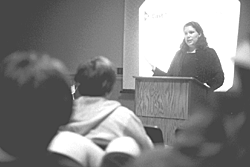

As violence has persisted in East Timor since voters in a UN sponsored ballot overwhelmingly showed their support of the island's independence, students had an opportunity Wednesday to hear a first hand perspective of the situation in the former Portugese colony which, until the vote, has been occupied by the Indonesian military since 1975.
Guest speaker Emily Citkowski spent the majority of the summer in Indonesia working with the pro-independence student organization PRP. Afterwards, she spent the week prior to East Timor's vote for independence in Dili, the capital of the disputed region.

Citkowski offered a brief history of the current conflict, as well as her own insights and observations into the conflict surrounding East Timor. The Solidarity Organization sponsored Wednesday's discussion on human rights abuses currently reported to be taking place in East Timor.
She cited the many cultural differences that exist between East Timor and Indonesia, alluding to the fact that the current turmoil is fueled by genocidal tendencies. Three quarters of the East Timorese have been displaced from their homes and a conservative estimate of the death toll stands at 7,000 people, facts which she stressed.
While in Dili, Citkowski stayed with IMPETUU, a pro-independence student group that ironically was started by the Indonesian government in order to train young people for future leadership positions. The office where she was being housed would repeatedly receive telephone threats from anti-independence militias, specifically a group called Atarak. At the time that Citkowski was there, no signs of overt violence had yet surfaced.
The militias would intimidate the pro-independence citizens, however, making it unsafe to leave the IMPETUU office after dark. Citkowski said, "The people were very focused on making the referendum happen and gaining independence for their country."
According to Citkowski, the Indonesian military, which is under suspicion for backing anti-independence militia groups, assumed that they would be able to intimidate the citizens of East Timor into voting to stay part of Indonesia. However, 98 percent of the citizens of East Timor showed up to vote and of those, 78 percent voted pro-independence. Of the level of dedication exhibited by the citizens of East Timor, Citkowski said, "I was constantly amazed at their level of focusedness and their bravery."
Citkowski highlighted the role of the United States, particularly the military, in the Indonesia/East Timor conflict. The U.S. reportedly doubled military aid to Indonesia soon after its invasion of East Timor in 1975. Since that year the U.S. has provided Indonesia with $1.1 billion in weapons.
She urged students to take an active role in the plight of the East Timorese and voiced her opinion on the United Nation's handling of the situation. "I think that the [United Nations] went in much too late and a lot of this could have been prevented."
Speaking on crisis: Emily Citkowski lectured on the violence occurring in East Timor during its independence struggle. (photo by Elizabeth Fein)
Copyright © 1999, The Oberlin Review.
Volume 128, Number 5, October 1, 1999
Contact us with your comments and suggestions.